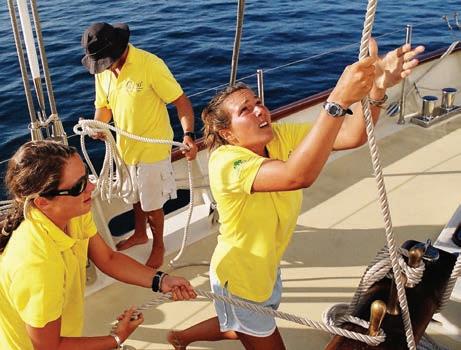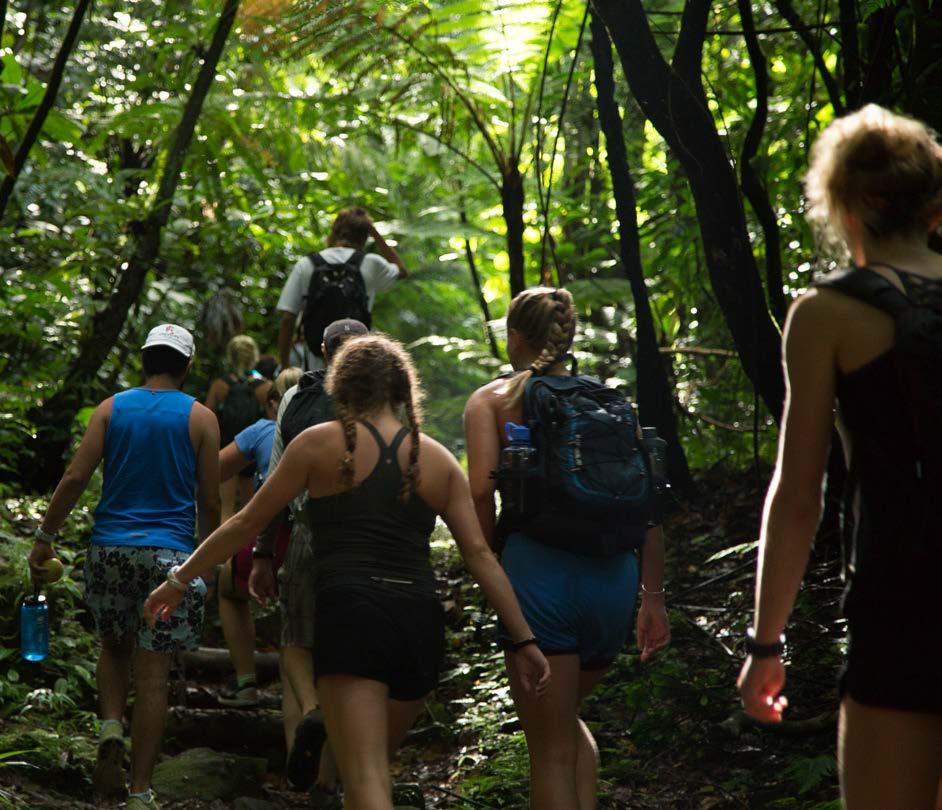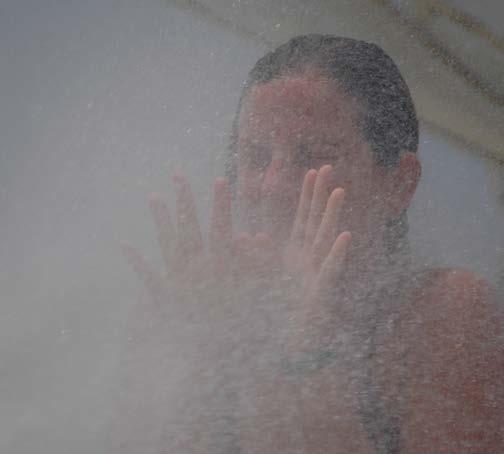
9 minute read
LIFE ABOARD SHIP
18 ABOARD ARGO & VELA WE TYPICALLY MAKE ABOUT 300 GALLONS OF FRESH WATER PER DAY USING OUR REVERSE OSMOSIS SYSTEM. SOUNDS LIKE A LOT? IN THE US AN AVERAGE PERSON USES 80 GALLONS PER DAY SO WITH 30 PEOPLE ABOARD WE SOON LEARN TO CONSERVE!

Advertisement
SETTING YOUR OWN COURSE
"At first, living On-board Argo was like living on another planet. We stared blankly if one of the staff members asked us to wax the gunwales or sheet in the main. But every day the crew becomes more comfortable and more self sufficient, and Argo is turning into home. None of us knows what lies ahead, but it is sure to become the experience of a lifetime."
Rebecca G., Western State
LIFE ABOARD
No one speaks more eloquently about Sea|mester than those who have participated in the program. We hope in reading about life on-board, you gain a real sense of what adventures await you, of the experiences you’ll share with your crewmates, and how the power of those experiences will help to create a bond shared between you that will last a lifetime. No matter what future you envision for yourself, whether it is something related to the sea or something quite far afield, Sea|mester will broaden both your geographical and personal horizons in the deepest, most meaningful of ways.
BE A SAIL, NOT AN ANCHOR Your first week or so on-board, you learn the basics of sailing and of operating the vessel. You have your first lectures in your academic courses. You begin to understand that everyone shares responsibilities for everything from planning itineraries and provisioning to cooking and cleaning. There are no passengers on this voyage; on-board everyone is a part of the crew and must be a sail, not an anchor if the voyage is to succeed. As the first close working relationships develop, your support for one another, your confidence in yourself, and your enthusiasm grows.

"When it comes to sharing responsibilities aboard, the ‘Job Wheel’ plays a monumental role. The wheel has everyone’s name listed on it with the responsibilities listed around it. Everyday it rotates and whatever job corresponds to the crewmember’s name is his or her duty for the day. One day you may be a Deckie and the next the Skipper. Responsibilities aboard find a way of balancing themselves out among the crew and with every new turn of the wheel comes another duty. And in the end, every Deckie has his or her day!"

Desiree T., Gap Year Student
A TYPICAL DAY There is no typical day aboard ship. Some days involve exploring an island, contributing to a service project, performing research, diving, or hiking. Whatever your day brings, with it comes new challenges and discoveries about the world around you and yourself. As the days pass, your view of the world and yourself change.
"What is a typical day on Argo, when every day is an adventure in itself? Most young adults join the world of the living around 10am or later, not realizing the amount of things that can be accomplished earlier. On-board, by the time the rooster cries, every member of our 29-person crew may have hopped in a dinghy for a ride to shore and already hiked halfway up a mountain. Fifteen people may have gone swimming with sea horses, turtles and frogfish for 60 minutes and are now enjoying their surface interval before submerging to 60 feet again. These are the kind of mornings Argo and her crew likes to enjoy."

Leah S., Mary Washington College

LIFE ON-BOARD Life on-board is undoubtedly different from life onshore. Many discover the challenges allow them, for the first time in their lives, to move outside their comfort zone, where they have enormous opportunities to grow and realize the boundlessness of their potential.
"Life aboard with Sea|mester is very different for me. Before this trip, I had friends and family constantly surrounding me; my own room, Internet access, a newspaper and a closet full of clothing. Now I have a new set of friends whose backgrounds span the world, a bunk, a cubby, and a uniform of bare feet and bathing suits. I haven’t talked to my family in a week, classes are enjoyable and my school has sails attached to it! It’s not that I feel limited by this new life; in fact, I find it incredibly refreshing. I’m genuinely enjoying not having things from my world. I’ve come to realize, in only a few short days, how unnecessary some are. These proposed ‘limitations’ are actually assisting our group to bond. Cooking together, hanging out at night and doing all the same assignments have encouraged the realization that these people are not just classmates; each is going through this journey with me."

Drew H., Rollins College

ARGO’S CROSSING INTO THE SOUTHERN HEMISPHERE COMMEMORATES THE CREW’S FIRST TIME CROSSING THE EQUATOR. IN CELEBRATION, THE CREW PARTICIPATES IN THE NAUTICAL TRADITION OF THE EQUATORIAL BAPTISM, WHEN THE POLLYWOGS (SAILORS WHO HAVE NEVER CROSSED THE EQUATOR) JUMP INTO THE OCEAN AT ZERO-LATITUDE.



SHOWER TIME
"After a long day in the sun, nothing feels better than a Sea|mester shower. When this delightful time of day comes around, usually between 3-5pm, we all gather on deck, ‘product’ (soap, shampoo etc.) in hand, sporting a bathing suit or board shorts, ready for a refreshing jump off the vessel’s starboard side. After the first dive, we climb back up and lather up on deck. Once shampooed and fully scrubbed down with a few squirts of Dial body wash, its time for the final salt water submersion before a cool freshwater rinse off via the deck hose. When we first arrived, Dan told us that by the end of the voyage students actually prefer the Sea|mester method of bathing over a normal shower or bath. At first I was skeptical but I think he might just be right."
Jacqueline G., Gap Year Student

"You get a real sense of pride knowing you’re helping provide food for your fellow shipmates and having an awesome time doing it. My provisioning experience started with a long ride through Antigua. In theory it’s pretty simple. We decide on our meals for the week, we write down what we need and we go and get it. But we’re in the Caribbean and that mixes things up a bit. Some things are hard to find, but that’s what makes it so much fun. The best thing was checking out and the look on the cashier’s face when she saw the sheer amount of groceries we got. Shopping for a family of four can be fun but shopping for a family of 18…!"
Henry R., Gap Year Student
GENERAL WETNESS
"If you live on a boat, you know you’re going to be wet. We’ve accepted this and anticipate a little wetness from time to time: we’re surrounded by water, we don’t even flinch at sea spray and we tread carefully so as not to slip on deck. Most of the time the sun is shining and getting wet happens when we shower. All that has changed due to a few recent squalls: Ocean Star has become a wet and wild world. Some storms sprinkle us for a time while others dump buckets, covering up the cries of “Close the hatches!” The rain jacket has become the fashion statement of the voyage. I prefer a bright, screaming yellow to offset my wet brown hair!"
Drew H., Rollins College

WATCH OUR THREE-PART DOCUSERIES AT WWW.SEAMESTER.COM AND LEARN MORE ABOUT OUR ADVENTURES CIRCUMNAVIGATING THE WORLD.

"During watches there is much bonding going on between watch team members. Long hours in the middle of the night are spent in conversations meant to pass the time. Sailing at night is definitely an experience unlike any other. With nothing to light our way other than the moon and the millions of stars most of us suburban kids never even knew existed, we now strike and raise sails basically with our eyes closed, and we do it well. When on bow watch we frequently see dolphins, outlined in the dark waters by bioluminescence. For most of us, it is the most amazing sight we have ever seen."
Annie H., Fordham University

"Our first night in the Tobago Cays consisted of a night dive… To see the reef in the dark was definitely a change. We were able to see the nightlife on the reef and we even saw a few new animals. An octopus, snake eels, and lobsters were the highlights of our dive. Those who dared to turn off their flashlights were immediately bitten by hundreds of curious little fish that couldn’t harm us at all."
Chris D., Flagler College
"Life on passage is something that is hard to translate to those who have never experienced it. First, don’t ask me to tell you what the date is, much less the day of the week, or even the difference between yesterday, today and tomorrow. Your life is no longer divided into days but into watch schedules, on for three hours and off for six. Once you lose track of the days and the time, you know you’re in for the long haul. After a little over a week of this new lifestyle, most of us felt as if we could continue on for months.
Few people can say that they have crossed an ocean, much less aboard a 112-ft sailing vessel. The twenty-five of us aboard Argo can now proudly say that we have accomplished just that. And I feel that I could have kept sailing until we reached the edge of the earth."

Annie H., Fordham University

DURING OUR CIRCUMNAVIGATION THE LONGEST PERIOD OF TIME THAT WE SPEND OUT OF SIGHT OF LAND IS 21 DAYS AS WE MAKE PASSAGE ACROSS THE PACIFIC OCEAN BETWEEN THE GALAPAGOS AND THE MARQUESAS.








